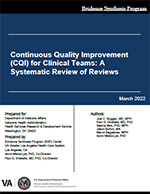
|
Prepared by: Recommended citation: |
Download PDF: Complete Report, Executive Summary, Report, Appendices
Of 36 reviews of continuous quality improvement (CQI) frameworks in healthcare, one compared the effectiveness of different frameworks. This review found no evidence any framework was more effective, concluding local context should dictate choice of methodology. While reviews have shown success for CQI frameworks within specific contexts, many scored low on methodological quality. Thus, evidence gaps remain regarding whether any CQI framework is superior to others and how context factors into implementation success or failure.
CQI frameworks are system-level approaches to improving healthcare quality and safety through systematic data-guided activities, iterative development and testing of processes, and designing per local conditions. Lean management is one of the most popular CQI frameworks in healthcare settings, but there remains uncertainty as to whether Lean is superior to approaches such as Six Sigma or Clinical Microsystems. Uncertainty also exists for which intervention- or system-level contextual factors affect success or failure of CQI frameworks.
We identified 36 reviews, which described successful implementation of multiple CQI frameworks in various clinical settings. One 2008 review with low methodological quality directly assessed relative effectiveness of CQI frameworks, while 11 other reviews included more than one CQI framework without a direct comparison. No review reached a strong conclusion any framework was superior to any other(s). However, many reviews showed evidence CQI methodologies have been successfully implemented in a variety of clinical settings. None of the seven publications describing sustainment of change found definitive evidence for sustainment. Additionally, no review directly commented on health care workers' reactions to CQI framework implementation, what they learned or retained as part of CQI training, nor any behavior changes noted after implementation. Twenty reviews described at least one contextual factor related to success or failure of CQI frameworks, but none compared the success or failure of different CQI strategies based on these factors.
Continuous Quality Improvement (CQI) for Clinical Teams: A Systematic Review of Reviews (Management eBrief)